#megalodon
Explore tagged Tumblr posts
Text






My fossil collection. Tyrannosaurus rex tooth replica, juvenile Spinosaurus tooth (real fossil, my prized possession), Allosaurus claw replica, Megalodon tooth (real fossil), a pair of fish fossils (not sure on the species).
#red squeaks#fossils#tyrannosaurus rex#spinosaurus#allosaurus#megalodon#fish#vulture culture#paleoblr
34 notes
·
View notes
Text

Into the Dark Water
#worlds beyond number#wbn#wbn fanart#brennan lee mulligan#in retrospect I should have added The Don#megalodon#shark#aabria iyengar
2K notes
·
View notes
Text

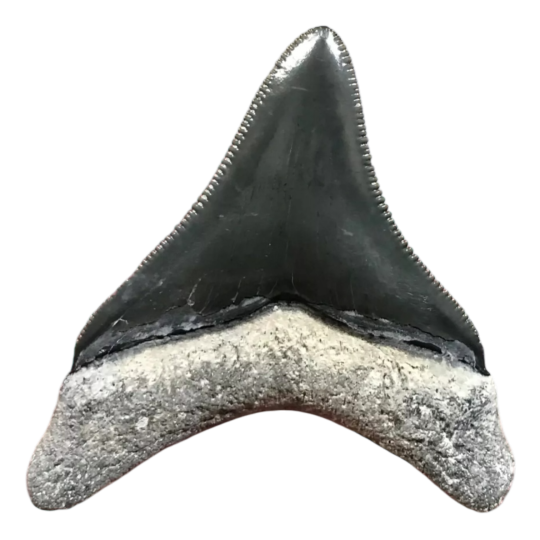

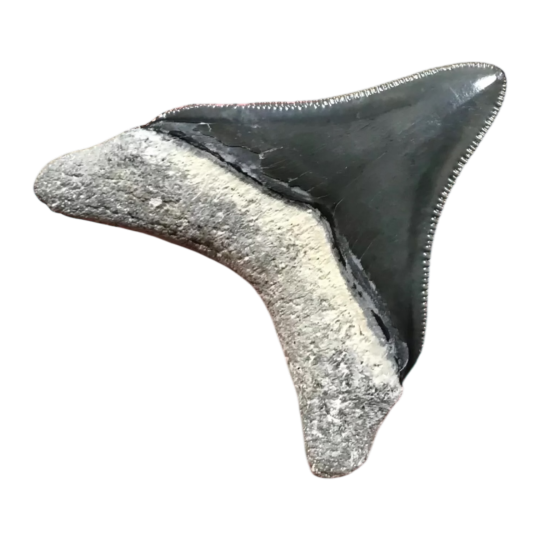
B.VALLEY - MEGALODON SHARKTOOTH FOSSIL
#shark tooth#🦷#shark#fossil shark teeth#shark tooth fossil#sharks#teeth#tooth#png#transparent#shark teeth#paleontology#paleoblr#paleo#megalodon#fossil#fossils#ocean#transparent png
108 notes
·
View notes
Text
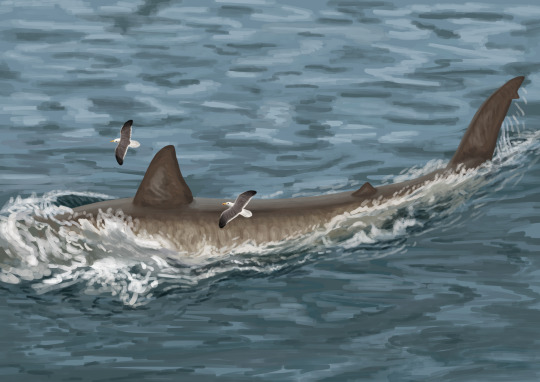
Two gulls follow a weird fish. Featuring the newly elongated Otodus megalodon.
4K notes
·
View notes
Text













M is for...?
All of the M names in my Paleo Party Cenozoic section! I have so many M names, I had to split them up into a few parts! Are there any I'm missing? (The Maned Wolf is often called a Living Fossil, so therefore they fit into the paleo party still. They are not extinct, no one panic)
Stickers || Phone Wallpapers Masterlist
#art#my art#paleoart#paleontology#science#illustration#maned wolf#moeritherium#megacerops#megaloceros#megalonyx#megalodon#micromeryx#mammoth#mastodon#megalania#merychippus#macrauchenia
605 notes
·
View notes
Text
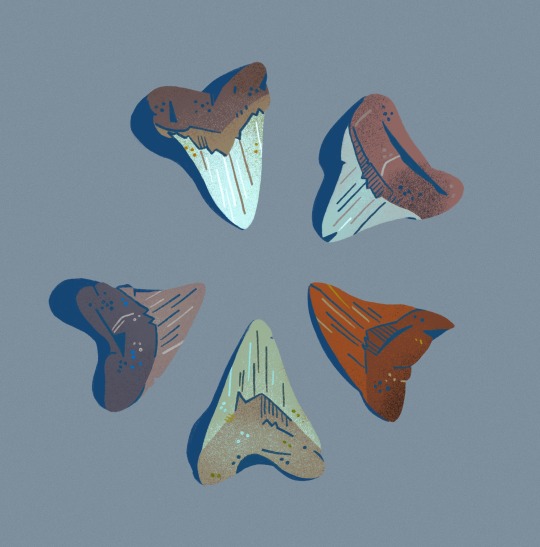
i love megalodon tooth shapes
839 notes
·
View notes
Text
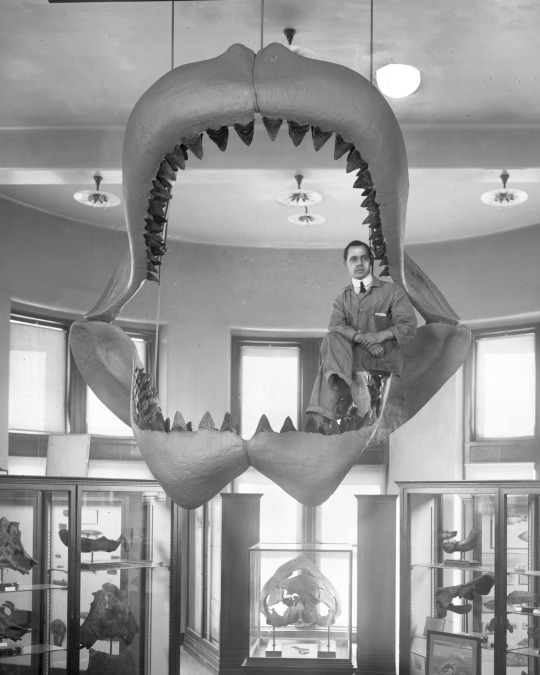
Shark Week begins this weekend, so take a bite out of Fossil Friday! Check out these massive jaws and colossal teeth. They belong to Otodus megalodon: a gigantic shark. Dwarfing all living species of shark, megalodon measured roughly 50 feet (15 meters) long. What’s more? Megalodon had a bite force of 41,000 pounds—10 times the biting power of the great white shark (Carcharodon carcharias), which can chomp down with a force of 4,000 pounds!
Fun fact: The first attempt to reconstruct the jaw of this colossal predator took place right here at the Museum. This photo, snapped all the way back in 1909, showcases an early reconstruction of megalodon’s massive jaws with a human for scale. The oldest known megalodon fossils date to approximately 20 million years ago, but it is believed that this marine predator roamed the seas until about 3.6 million years ago, when it vanished into extinction.
You can spot the fossilized remains of this prehistoric predator at the Museum! Plan your visit.
Photo: Image no. 32521 / © AMNH Library.
303 notes
·
View notes
Text

world's largest shart
385 notes
·
View notes
Text

Monster Megalodon tooth found by CMM paleontologists at Calvert Cliffs, Maryland
Photo: Calvert Marine Museum Fossil Club
383 notes
·
View notes
Text
Realistically, because megalodon targeted large, energy-dense prey, it probably only needed to hunt once every one to two weeks. The rest of the time it would have just been, like, chilling, 9 days out of 10. And I think that's pretty neat.
1K notes
·
View notes
Text





















collection of all the prehistoric ocean period sets
#illustration#digital art#art#aesthetic#illustrators on tumblr#animals#character design#dinosaur#paleoart#paleontology#paleoblr#paleomedia#artists on tumblr#dinosaurs#paleoposting#paleo tag#paleobiology#mosasaur#plesiosaur#megalodon#dunkleosteus#basilosaurus#late cretaceous#jurassic period#triassic
475 notes
·
View notes
Text

It’s time to give the animals of the Cenozoic a day in the limelight…
#cenozoic mammals#cenozoic era#cenozoic#works in process#work in progress#work in process art#work in progress art#art wip#wip#mammoths#wooly mammoth#wooly rhino#smilodon#basilosaurus#andrewsarchus#brontothere#paraceratherium#deinotherium#hominids#paleocene#eocene#oligocene#miocene#pliocene#pleistocene#pleisotcene megafauna#paleogene#neogene#quaternary#megalodon
473 notes
·
View notes
Text
The megalodon has long been imagined as an enormous great white shark, but new research suggests that perception is all wrong. The study finds the prehistoric hunter had a much longer body—closer in shape to a lemon shark or even a large whale. The study team, which included researchers from the University of California, Riverside and across the globe, used a novel approach to estimate the shark's total body length, moving beyond traditional methods that rely primarily on tooth size. By examining megalodon's vertebral column and comparing it to over 100 species of living and extinct sharks, they determined a more accurate proportion for the head, body, and tail. The findings, published in the journal Palaeontologia Electronica, suggest the prehistoric predator may have reached about 80 feet, or about two school buses in length. It also likely weighed an estimated 94 tons, comparable to a large blue whale, but with a body designed for energy-efficient cruising rather than continuous high-speed pursuit.
Continue Reading.
166 notes
·
View notes
Text


Serrated, 3.72" Fossil Megalodon Tooth - South Carolina
#miocene#pliocene#125$#megalodon#megaladon tooth#tooth#teeth#teeth fossil#tooth fossil#fossil#fossils#png#transparent#shark teeth#paleontology#paleoblr
34 notes
·
View notes
Note
One of my teachers believes megalodon is still alive, what should I tell him? It's the usual "Well, you can't prove it's not around" sort of argument
Oh brother... well, he's definitely wrong, because proving that megalodon isn't around anymore is incredibly easy! It's as simple as, "how come we don't see tons and tons of discarded megalodon teeth that date back only a few years, or even a few centuries and millennia, and we only find fossilised teeth?" See, megalodon tooth fossils are very common, and that's because the meg like all (most?) sharks shed their teeth as they grew new ones. If the meg was still alive we would see those giant teeth, even if the sharks themselves were "hidden" then eventually those teeth would wash up ashore after several years. But we never find them! Nor do we find lots of whale or large fish carcasses with massive bite chunks on beaches, or even living whales with battle scars left over from narrowly escaping the jaws of the meg. We could speculate on the giant squid thanks to sperm whales having fighting scars from them, but there's no similar phenomenon for the meg! The government can't hide EVERY tooth and carcass.
Oh and then there's also the more general stuff. "We've only explored 5% of the ocean we don't know what's out there" that mostly applies to the deep ocean where life is scarce. The megalodon lived in the tropical and subtropical regions of the world and was a predator of the topmost layers of the ocean, most likely. It's also theorised to have given birth close to the coast. In the coastal and shallow parts of oceans we would've sooner or later spotted them. "What if it just evolved to live in the deep sea" Such a large, specialised animal that was dependent on coastal waters for breeding? In such a short amount of time, while its prey was going extinct and the climate cooled? Unlikely. The meg ate whales and large fish to support its humongous size, where does one find such prey on the bottom of the ocean, I wonder? One does not. "Maybe it evolved to filter feed" wh- Then that's no longer the megalodon, is it!!???? There are real, actual super interesting and cool filter feeding sharks that need our attention and protection, and if someone's willing to completely ignore them for the sake of a stupid argument about their beloved megadeath murdershark still existing, then that's pretty sad. At that point you can calmly whisper, "it's okay, shhhh, you can let her go. It's okay. You can miss her, but you need to let her go."
Ah, if you're going to attempt to talk to your teacher about this, I do recommend you don't get snarky like I do about this matter, because that tends to get people on the defensive. No one wants to feel like they're being made fun of (very understandable)! I'm just personally very dumbfounded about people who willfully ignore science in favour of going "I wish this cool giant gigamurder killershark was still alive so I'm going to think that way now"
319 notes
·
View notes
Text

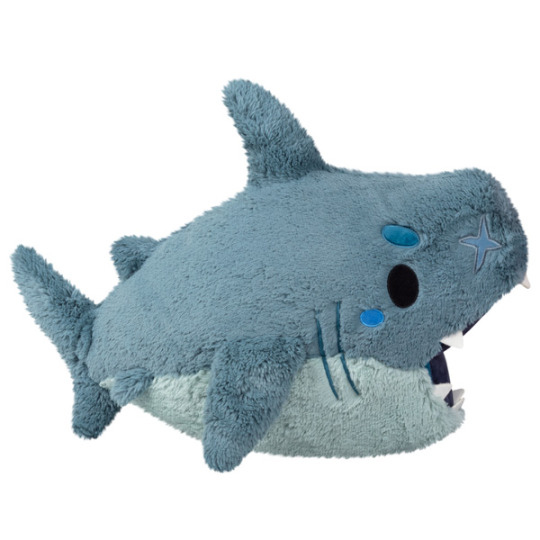
Source ~ Squishables
Megalodon
#plushcore#plushie#plushies#stuffed animal#stuffie#stuffies#stuffed animals#cute#soft#squishables#Megalodon
432 notes
·
View notes